Kirin Group's integrated approach to creating a positive impact on the future by addressing issues related to natural capital that coexists with human activities
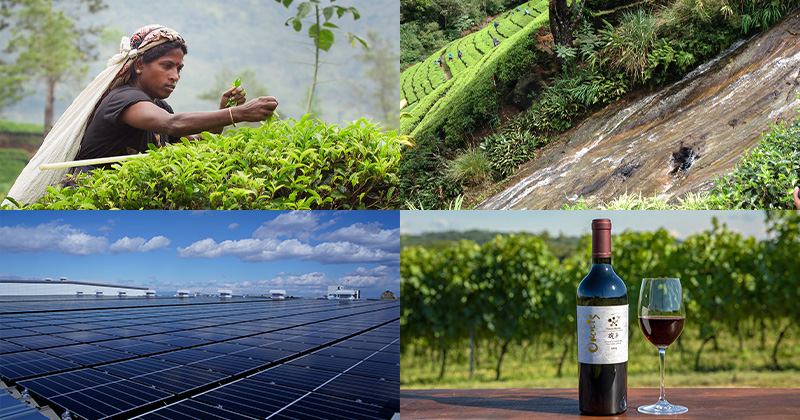
Various environmental issues around the world are interrelated and influence each other. For example, industrialized agriculture, such as monoculture and mass production, leads to the loss of biodiversity and soil degradation. Soil degradation makes it difficult for plants to grow, which in turn reduces their ability to absorb and sequester carbon. When carbon absorption and sequestration are reduced, CO2 concentrations in the atmosphere increase, leading to global warming and climate change. Climate change causes changes in weather patterns, which in turn cause various disasters and devastate ecosystems and people's lives.
As you can see, the natural world comprises a complex network. Therefore, attempting to solve one problem may cause or exacerbate other problems. Furthermore, the effects of these problems take a long time to become apparent. It is necessary to address global environmental issues with a holistic approach and a long-term perspective that takes into account the future generations.
The Kirin Group has established the Kirin Group Environmental Vision 2050, which sets “Positive Impact for a Healthy Earth” as an important message. The vision aims to create a heartful society and a healthy Earth for future generations by generating positive impacts on nature and people. To achieve this, the Group is conducting activities that holistically address four environmental issues, depletion of biological resources and water resources, environmental impact of packaging, and climate change. This approach is based on the understanding that various environmental issues and human activities are interrelated.
In this article, we will introduce Kirin's approach to nature, which forms the foundation of our activities, examples of how this holistic approach is having a positive impact on local ecosystems and people, initiatives to utilize renewable energy from a long-term perspective and on a large scale, and activities to work with the younger generation to ensure a prosperous future for the planet.
The brewing philosophy “respect for life” is the foundation of our activities

The Kirin Group's understanding of the importance of a holistic approach is based on its philosophy of brewing, which is rooted in respect for life. Water, hops, and barley, the raw materials used in the Group's original beer business, are all gifts of nature. Yeast, a microorganism, breaks down the sugar in wort into alcohol and carbon dioxide, which determines the flavor of beer.
In order to brew delicious beer, we must respect the power of nature and humbly learn from it. That is why the attitude and commitment to protect the natural environment and biodiversity are deeply rooted in the Kirin Group's corporate culture.
The Kirin Group is the first food company in the world to achieve net-zero certification under the international initiative SBT Initiative*1. Additionally, it is the first company globally to disclose information on natural capital using the LEAP approach*2 of the Task Force on Nature-related Financial Disclosures (TNFD). These achievements have been highly regarded worldwide as an accomplishment of the Kirin Group's long-term efforts to learn from nature and engage in environmental activities.
*1: SBT Initiative is an abbreviation for Science Based Targets Initiative, an international organization that helps companies and financial institutions set greenhouse gas emission reduction targets based on scientific evidence.
*2: An approach proposed by the TNFD for assessing and managing nature-related risks and opportunities. It consists of four steps: Locate, Evaluate, Assess, and Prepare.
Examples of holistic approaches that create positive impacts on nature and people
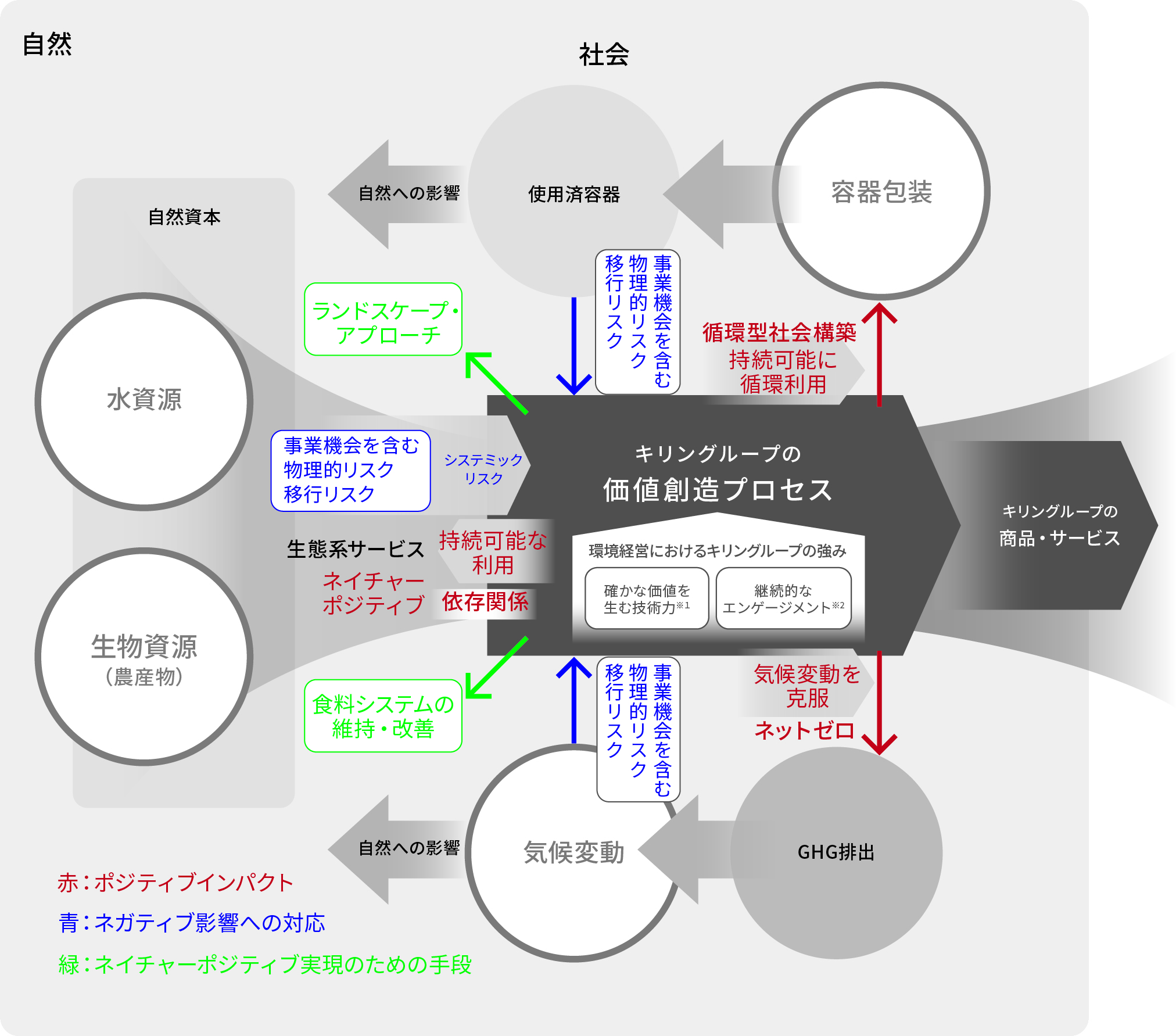
The Kirin Group uses an “Environmental Value Correlation Map” to show how various environmental issues and approaches affect its business activities. This chart provides an overview of how four environmental issues, such as depletion of biological resources and water resources, environmental impact of packaging, and climate change, and their solutions, interrelate and can create positive impacts. Among these solutions, two methods generate positive impacts through a holistic approach: the “Landscape Approach” and “Maintaining and Improving Food Systems.”
The Landscape Approach is a method proposed by the Global Biodiversity Framework (GBF) that comprehensively manages the diverse human activities and natural environments in raw material production areas to derive sustainable solutions. “Maintaining and improving food systems” is the other method that views food not as just agriculture, but as a single system encompassing food production, processing, distribution, consumption, and waste. This approach is considered holistic because it positively impacts raw material production areas, contributes to the stable procurement of raw materials and brand enhancement, and leads to regenerative production, thus restoring the environment.
The Kirin Group is implementing the Landscape Approach to support environmentally regenerative agriculture in Sri Lanka and the Maintenance and Improvement of Food Systems to evaluate ecosystem restoration and study carbon storage effects in vineyards in Japan.
Activities in Sri Lanka to restore ecosystems and improve the livelihoods of producers
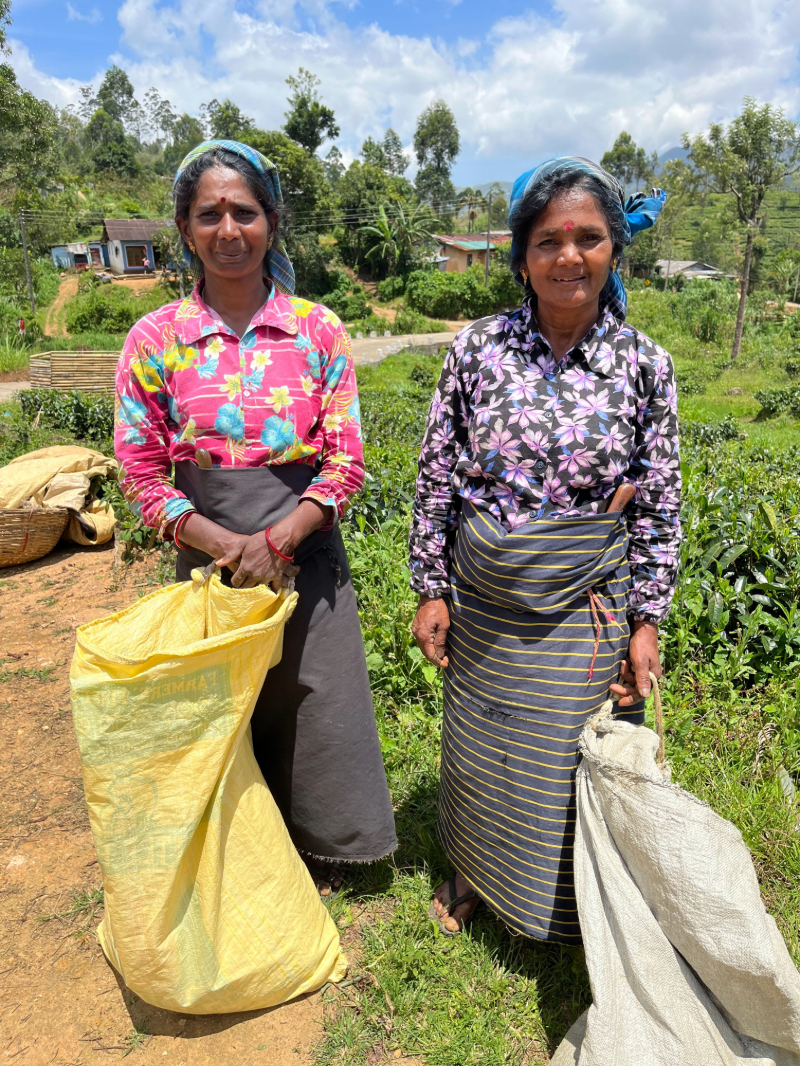
The tea leaves used in Kirin Afternoon Tea are imported from Sri Lanka, accounting for approximately 20% of the tea leaves imported into Japan. As such, we bear a significant responsibility for the leaf production’s environmental and social impacts. Therefore, since 2013, we have been supporting the acquisition of Rainforest Alliance Certification, which aims to enrich the land through agriculture that regenerates the environment and improves producers’ working environment and wellbeing. By the end of 2022, 94 large farms, equivalent to about 30% of certified large farms in Sri Lanka, had obtained this certification through this support.
However, obtaining this certification requires significant time and financial resources, leading to the exclusion of small farms that lack the means to pursue sustainable agriculture despite their intentions. To address this issue, we have been collaborating with the certification body since 2023 to develop the Regenerative Tea Scorecard. This scorecard is based on the Rainforest Alliance's definition of regenerative agriculture and outlines methods to promote soil health, biodiversity conservation within farms, ecosystem restoration, and improved livelihoods for farm workers. Tea farms can use the scorecard to evaluate their current agricultural practices and identify areas for improvement in transitioning to regenerative agriculture.
Furthermore, since 2018, we have been working to preserve micro watersheds, water sources where rainwater seeps into the ground and creates springs, in order to enhance the sustainability of tea plantations and surrounding areas. We enclose micro watersheds within plantations with fences and plant native species around them. This creates biodiversity in the single-crop tea plantation and prevents soil erosion from mountain slopes from flowing into the water source during heavy rains.
This holistic approach not only enables the sustainable procurement of tea leaves but also improves the overall ecosystem of the production area, contributing to the well-being of the local people and generating social impact.
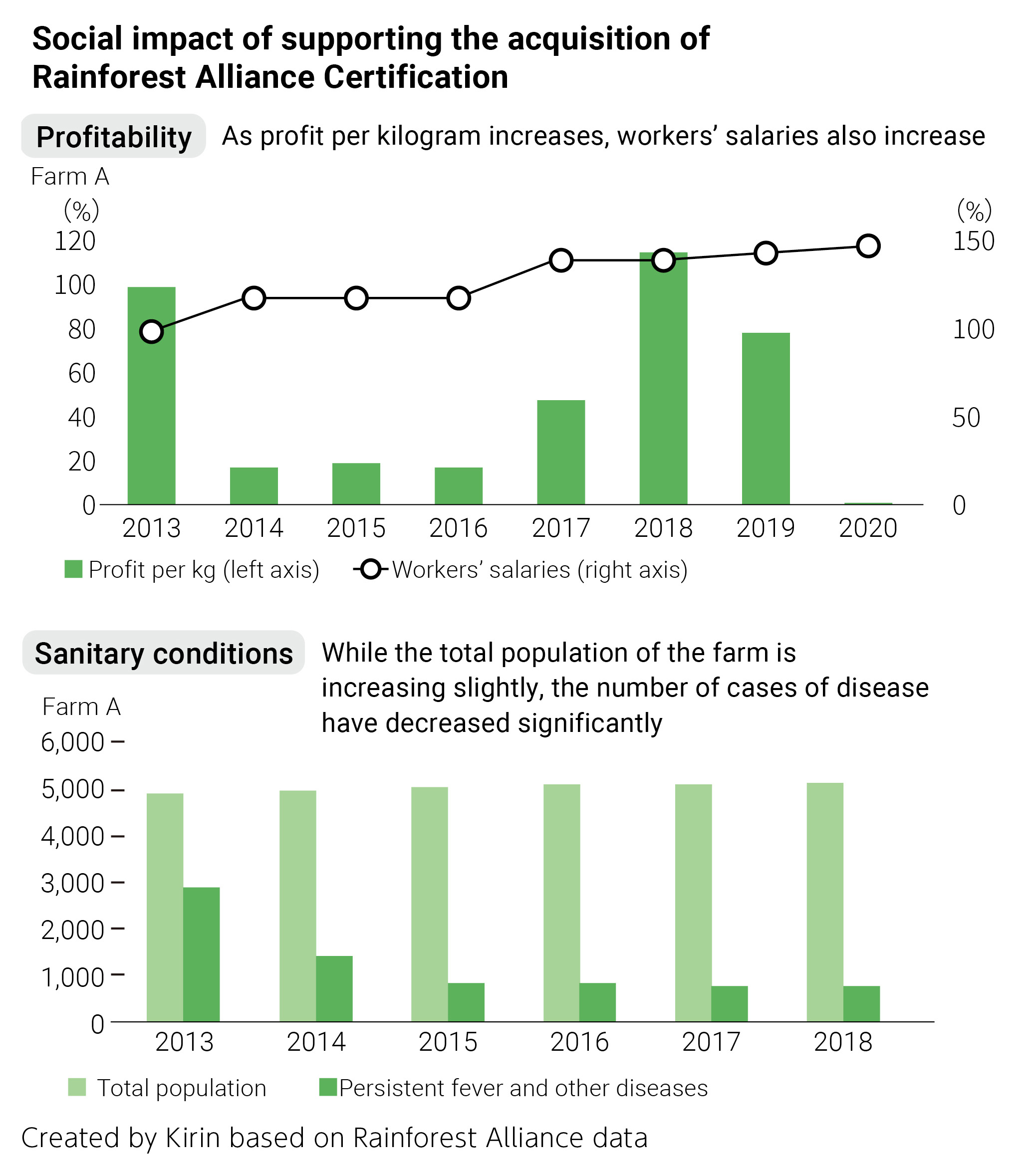
Activities to restore biodiversity and enhance carbon sequestration in Japanese vineyards
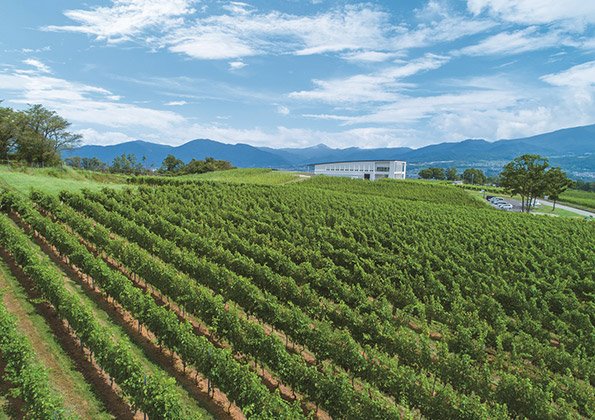
The “Mariko Vineyard” in Ueda City, Nagano Prefecture, operated by Mercian, a subsidiary of the Kirin Group engaged in the wine business, was a long-abandoned and neglected land that had become a regional issue. It was converted into a grass-covered vineyard in collaboration with local landowners and the government. This initiative aimed to restore biodiversity and create a place of pride for the local community. Since 2014, a joint research project by Kirin Holdings, Mercian, and the National Agriculture and Food Research Organization (NARO) has begun, and ecological surveys of the vineyard have been conducted. The surveys have identified 168 insect species and 289 plant species, including endangered species listed in the Ministry of the Environment's Red Data Book, confirming that the grass-covered vineyard possesses the functions of a high-quality, extensive grassland*3.
This is an example of creating “Nature Positive” through our business, and in 2023, it became the first agricultural site to be certified as a “Nature Coexistence Site*4” by the Ministry of the Environment, recognizing it as a location where crops are cultivated as part of the project. Additionally, we are accumulating knowledge in environmentally regenerative agriculture, such as activities to enhance carbon sequestration in soil and improve soil permeability by carbonizing pruned grape branches (biochar) and utilizing them as soil improvement materials.
Furthermore, Mariko Vineyard collaborates with local NGOs and elementary school students to increase the population of Sophora flavescens, the sole food plant of the endangered IA-class butterfly Shijimiaeoides divinus, and hosts environmental education classes for students at Shiozawa Elementary School near the vineyard, fostering community ties and providing educational opportunities for children.
*3: Grasslands contain the highest number of rare species per unit area and are considered valuable. About 140 years ago, they accounted for about 30% of the country's land, but now they account for less than 1%, making grasslands themselves rare.
(Reference) https://www.env.go.jp/content/000164774.pdf
*4: Areas recognized by the national government where biodiversity conservation is being promoted through private-sector initiatives. This is part of the Ministry of the Environment's efforts based on the “30by30 (Thirty by Thirty)” goal, which aims to effectively conserve at least 30% of land and sea areas as healthy ecosystems by 2030.
(Reference) https://policies.env.go.jp/nature/biodiversity/30by30alliance/kyousei/
Both the Sri Lankan farms and Mariko Vineyard demonstrate the power of the Kirin Group's holistic approach, which aims to revitalize local communities by restoring and regenerating regional ecosystems, coexisting with nature, and working together with farmers and landowners to create a better future for all.
Initiatives with a long-term perspective and scale for the future
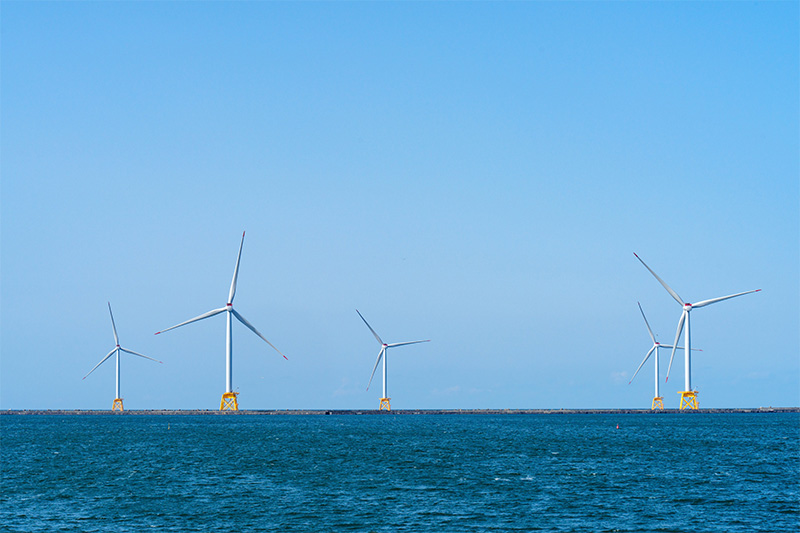
Environmental issues have a wide-ranging impact on the global ecosystem, climate, economy, and people's lives, so it is essential to have a long-term perspective and create a positive impact for the future. For example, climate change will impact decades to centuries, so reducing CO2 emissions and introducing renewable energy requires long-term initiatives. In introducing renewable energy, the Kirin Group emphasizes “additionality,” which refers to increasing the amount of renewable energy, and “ethical considerations,” which involves evaluating the negative impacts of constructing and operating power generation facilities.
The Kirin Group joined RE100*5 in 2020 and aims to use 100% renewable energy for its electricity consumption by 2040. Lion, which operates alcoholic beverage businesses in Oceania, became the first large-scale brewery in Australia to obtain carbon-neutral certification in 2020, and also obtained carbon-zero certification in New Zealand in 2021, having already achieved this goal.
All Kirin Beer factories and sales offices use 100% renewable energy for their electricity, and renewable energy accounts for 66% of Kirin Beer's total electricity consumption. In the future, we aim to replace all electricity used in Kirin Group operations with renewable energy and achieve RE100 as soon as possible. In addition, solar power generation facilities have been introduced under a PPA (power purchase agreement)at nine Kirin Beer factories, the Mercian Fujisawa Factory, and the Kyowa Kirin Ube Factory.
Furthermore, Kirin Holdings is participating as a partner company in a consortium led by Mitsubishi Corporation, which is developing Japan's largest offshore wind power generation project. This consortium has been selected as the power generator for three offshore regions: Noshiro City Mitane Town, and Oga City in Akita Prefecture, Yurihonjo City in Akita Prefecture, and Choshi City in Chiba Prefecture. The maximum power generation capacity of the three regions is approximately 1.69 million kW, which is enough to meet the electricity needs of approximately 1.21 million households. By leveraging the scale of this project, which is unique to a company of our size, we aim to make a significant contribution to the Japanese government's goal of achieving carbon neutrality by 2050.
Introducing renewable energy is a long-term initiative that will have a significant impact on society. By leveraging the knowledge and scale that the Kirin Group has built up over the years, we believe this project will deliver tangible results and be of significant social value.
*5: “Renewable Energy 100%” is an international initiative to source 100% of the energy consumed in business activities from renewable sources.
Empowering the next generation to build the future
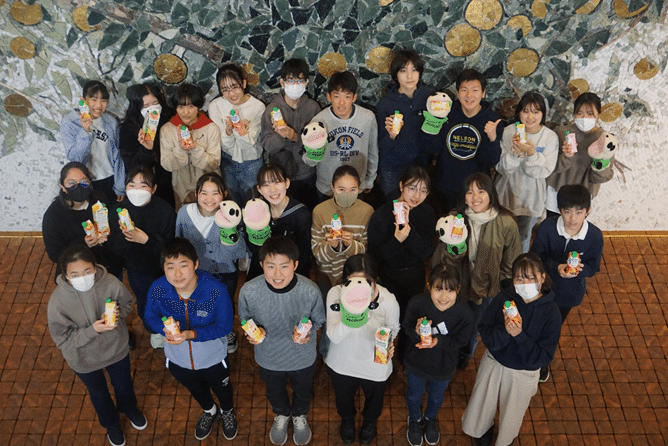
As part of our efforts to create a positive impact on the future, we have been running the Kirin School Challenge program since 2014, which involves young people of the next generation in discussions on environmental issues. This program has been awarded the Judging Committee Encouragement Award (Large Enterprise Category) by the Ministry of Education, Culture, Sports, Science and Technology's Companies Promoting Experience-based Learning Activities for Youth Award.
In March 2024, we co-hosted Kirin School Challenge workshop with the Junior United Nations Environment Conference, where middle and high school students discussed and shared their insights with their peers under the theme “Connected: Us and the World.” Within this program, the FSC® (Forest Stewardship Council) workshop brought together 24 middle and high school students who learned about sustainable forest use, reflected on the topic, and created messages to share with their peers using photos and text for social media. Everyone gained an understanding of the challenges facing sustainable forestry and our connection to the world. They discussed and presented efforts made by producers, companies, and consumers to create sustainable products, and ways to improve these efforts.
In this project, which has been ongoing for about 10 years, the high school students who participated in the first year are now in their late 20s and are becoming influential members of society. We look forward to seeing the projects that have blossomed over the years, drawing on the experiences gained in the workshops, and having a positive impact on the earth, society, and people. In this way, the Kirin Group goes beyond initiatives confined to the company itself, expanding the scope of its efforts and their ripple effects on society as a whole and working together with young people who will lead the next generation to build a better future.
This article introduced examples of environmentally regenerative agriculture based on the Kirin Group's brewing philosophy of “reverence for life,” as well as long-term, large-scale initiatives in renewable energy and activities to empower the next generation to build the future.
These initiatives are characterized by a perspective rooted in the fundamental principle that all living things, including ecosystems, the people who live in them, and local communities, are interconnected and form the basis of the Earth. This is why the Kirin Group's environmental initiatives are recognized as a leading force in international initiatives.
Going forward, the Kirin Group will continue to serve as a leader in passing on the Earth's bounties to future generations, making significant contributions to achieving net zero (decarbonization), nature positivity (restoration of biodiversity), and a circular economy.
Jun Kokufuda
Founder & Co-CEO of RIDE Inc., and Japan Representative of Pizza 4P's, a pizza restaurant chain operating in Vietnam, Cambodia, India, Japan, and Indonesia (scheduled to open by the end of 2024), which implements advanced environmental initiatives such as aquaponics and zero waste. He has directed the impact report for the three-star restaurant L’Effervescence, which promotes regenerative dining, and has handled branding for Greenpeace Japan & Ministry of the Environment Ambassador Daisuke Shikaku and Fairtrade Japan Ambassador Hinano Yoshikawa. As an official contributor to Forbes Japan, he writes articles primarily on sustainability, creativity, and compassion.
*Affiliations (contents) are as of the date of publication.